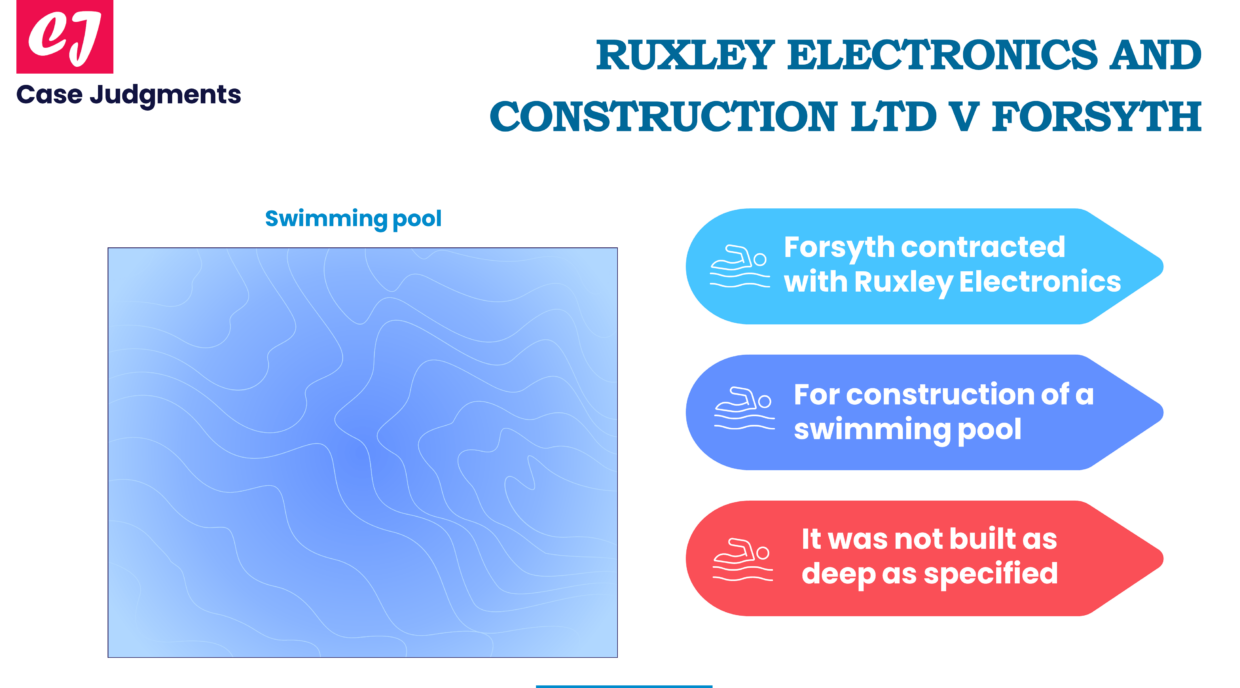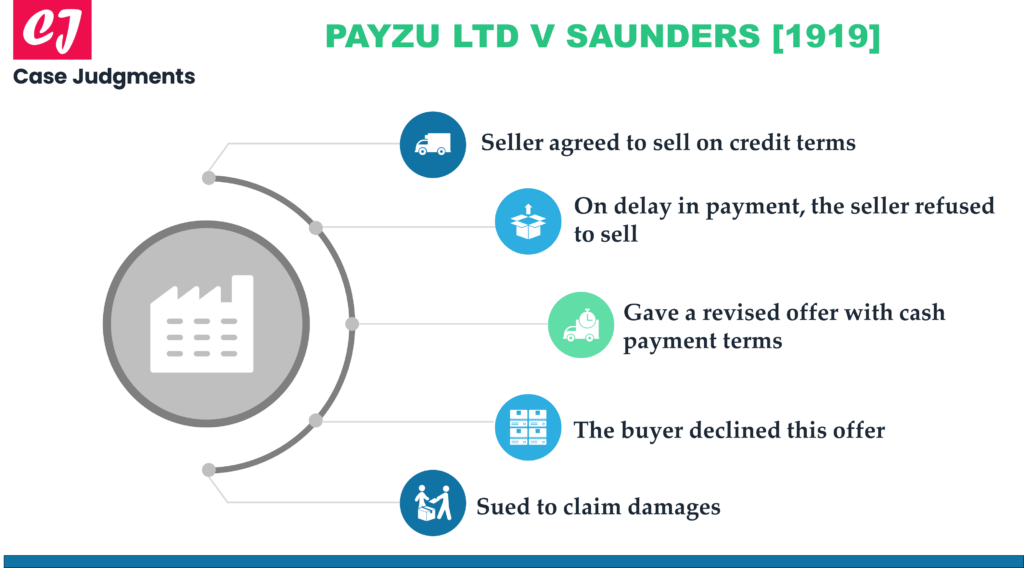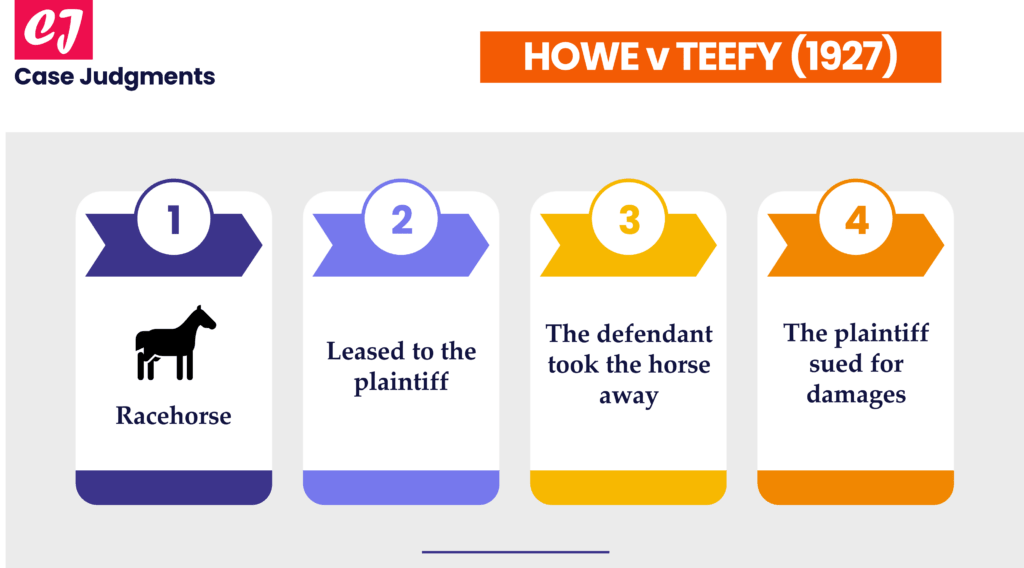
A Summary of Ruxley Electronics v Forsyth [1996]
Case name & citation: Ruxley Electronics and Construction Ltd v Forsyth [1996] AC 344; [1995] UKHL 8; [1995] 3 All ER 268
- Court and jurisdiction: House of Lords; England and Wales
- Decided on: 29 June 1995
- The bench of judges: Lord Keith of Kinkel, Lord Bridge of Harwich, Lord Jauncey of Tullichettle, Lord Mustill, Lord Lloyd of Berwick
- Area of law: Assessment of damages
What is the case about?
Ruxley Electronics and Construction Ltd v Forsyth is a landmark contract law case that concerns the challenges involved in assessing damages for defective performance of a construction contract. The difficulty arises especially where 1) there is no reduction in the property’s overall value despite the existence of defects and 2) the reinstatement cost for rectifying the defects is considerably higher than the benefits that the owner shall gain from the corrective measures.
Let us see the facts of this case.
Facts of the case (Ruxley Electronics v Forsyth)
In 1987, Mr. Forsyth engaged in a contractual agreement with Ruxley Construction Ltd whereby the latter would construct a swimming pool for Forsyth.
As part of the contract, it was explicitly stated that the swimming pool’s maximum depth should be 7 ft 6 in. However, after the pool’s completion, Mr. Forsyth discovered that the actual maximum depth was only 6 ft 9 in, and in the area where diving was most likely to occur, it was just 6 ft deep. During the contract negotiations, Mr. Forsyth had specifically asked for an amendment to raise the maximum depth to 7 ft 6 in, citing his larger size and the need for a deeper pool to feel safer while diving. Ruxley had agreed to this request without increasing the contract price.
Forsyth claimed that there was a breach of contract.
There was no diminution in the value of the constructed pool as compared to a pool with the specified maximum depth of 7 ft 6 in. But Forsyth sought to rectify the pool to meet the terms of the contract. The evidence presented during the trial established that the only way to achieve this was to demolish the current pool, excavate further, and reconstruct the pool, incurring a total cost of £21,560.
Issue
Whether Forsyth should be awarded the cost of reinstatement?
Judgment of the Court in Ruxley Electronics v Forsyth
The House of Lords determined that awarding the cost of reinstatement would not be justifiable. Instead, they upheld the trial Judge’s decision to grant the owner a modest sum of damages to compensate for the “loss of amenity”. The judgment involved overturning the majority decision of the Court of Appeal and reinstating the County Court’s original decision.
The Courts gave the following verdicts:
The trial judge:
In the trial judgment, Forsyth was awarded general damages amounting to £2,500 for the loss of amenity. The judge held that there was no decrease in the pool’s value as a result of the breach of contract (i.e., because of the shortfall in depth). Despite the pool not being as deep as specified in the contract, it was still safe for diving. And he deemed it unreasonable for Forsyth to proceed with the rectification work, as the cost of such work outweighed the benefits Forsyth would gain. Also, there were doubts if Forsyth would actually carry out the work.
The Court of Appeal:
The Court of Appeal, by majority, reversed the trial judge’s decision and instead granted Forsyth the full cost of achieving a cure, i.e., £21,560 in place of general damages.
The House of Lords:
The House of Lords upheld the decision of the trial judge and emphasized the matter of reasonableness. It concluded that it would be unreasonable to award the cost of reinstatement of the pool since it was wholly disproportionate to the benefits Forsyth would gain. Lord Lloyd said:
“If reinstatement is not the reasonable way of dealing with the situation, then diminution in value, if any, is the true measure of the plaintiff’s loss. If there is no diminution in value, the plaintiff has suffered no loss. His damages will be nominal.”
Moreover, Lord Jauncey expressed the view that it would be unreasonable to seek reinstatement costs when the main objective of the contract has been achieved to a substantial extent.
Key principle emerging from the case
In the Ruxley case, both the House of Lords and the Court of Appeal focused on two approaches to assess damages: (i) diminution in value, and (ii) cost of reinstatement. They held that if the cost of rectification was deemed unreasonable, the appropriate measure of damages should be based on the difference in value. While the pool may not have suffered any decrease in value, Mr. Forsyth was still entitled to receive compensation for the loss of satisfaction he experienced due to the pool’s non-compliance with the contract’s specifications.
List of references:
- http://www.austlii.edu.au/au/journals/WkoLawRw/1996/20.pdf
- https://www.hzu.edu.in/uploads/2020/10/business-law.pdf
You might also like:
More from contract law:

